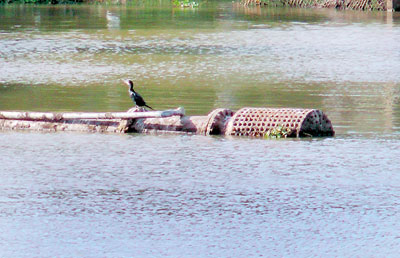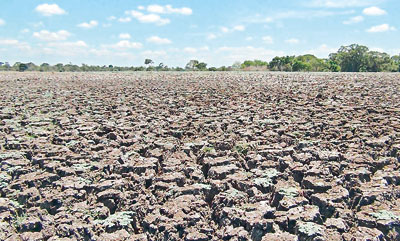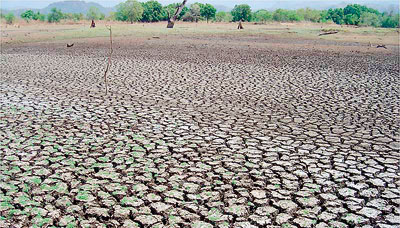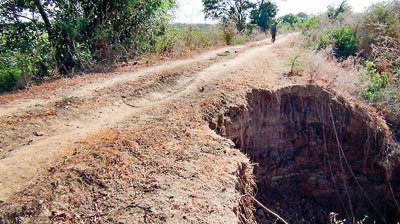News
Drought forces delay in Maha with more trouble to come
View(s):By Ravi Shankar

Hambantota water levels go down
The delay in the second inter-monsoon of the year has prompted the Department of Irrigation to postpone the Maha cultivation season to November, with the risk of a reduced harvest.
The second inter-monsoon normally starts during the beginning of October and is expected to be in full swing by the end of the month with the Maha season normally starting by mid-October. Although rain fell last week there were no heavy showers and the falls received were insufficient for cultivation. Worse, the Meteorological Department makes the disturbing prediction that monsoon rains this year will be less than in previous years.
“The Irrigation Department has 73 main water tanks and the water level in these tanks is only 33 per cent. Now the delay in rains have forced us to start the Maha season cultivation only by the first or second week of November, and that too depends upon the water level in our reserves,” Irrigation Department Director-General S.S.L. Weerasinghe said.
The rescheduling of the Maha season has brought predictions that the crops would be more prone to pest and insect attacks which, in turn, could reduce yield, Mr. Weerasinghe said, adding, “At present we do not have any programmes planned to cover the predicted pest attacks”.
With 15 districts identified as drought-stricken by the Disaster Management Ministry, many small-scale farmers in drought-affected districts such as Batticaloa and Hambantota have stopped farming and this has harmed their livelihood. “The small-scale farmers are suffering as the small tanks they were depending on have already dried up. If heavy rains are not received within two weeks the situation can worsen,” Mr Weerasinghe said.

Kukul Kotuwawewa Wilpattu
The department said it was trying to create more water reserves to cope with the cyclic process of drought and monsoon delay this was not easy because inundating forest land to create new tanks would limit wildlife habitat.
The drought has also hit drinking water supplies. The Water Board said demand for drinking water has increased by 15 per cent and around 2 million cubic metres of water are being supplied daily in 200 bowsers to the regions reporting increased demand.
“The Water Board is trying its maximum to provide uninterrupted drinking water supply and if situation gets bad we will cut down water supply for irrigation,” Board Chairman K.A. Ansar,said.
“We are asking consumers to use water sparingly. Avoid unnecessary usage such as watering the gardens, filling up swimming pools and washing vehicles,” he said.
Hydro-electricity production has also been affected, with water reserves in dams having dropped by half in some cases.

Dry tank Monaragala

Maha Wewa Puttalam

